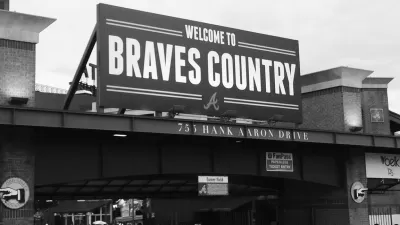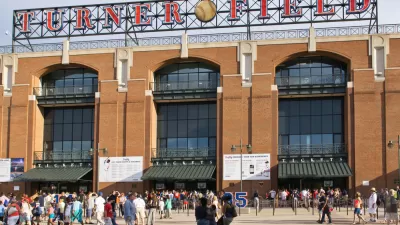A columnist absolutely eviscerates the Atlanta Braves organization as it plays its final game in Turner Field in Atlanta. The team is departing the city for a new suburban stadium in Cobb County.

"When Major League Baseball’s Atlanta Braves wrap up their final game at Turner Field on Oct. 2 against the Detroit Tigers, they’ll be throwing away a gift they never deserved," according to an article by Marketwatch columnist Jason Notte. "They’re tossing aside a 20-year-old ballpark in Atlanta proper for a $700 million SunTrust Park in Georgia’s suburban Cobb County for one of the most specious reasons imaginable: The city wasn’t paying them enough money or attention to stay."
According to Notte, Turner Field was a gift to the baseball gods, thanks to the legacy of the 1996 Summer Olympics, hosted in Atlanta. After NBC, sponsors, and the Atlanta Committee for the Olympic Games paid the $209 million cost for the stadium, it was "converted into a ballpark and handed over to the Atlanta Fulton County Recreation Authority in 1997. That group leased the building to the Braves while letting them operate it."
The greed of the Braves, as Notte describes it, came later, after the team's fortunes turned on the field and the team's management came looking for concessions off the field.
By 2012, the Braves were demanding complete control of Turner Field (for which they hadn’t paid a dime), 55 acres of city- and Fulton County-owned land around Turner Field (which it didn’t want to bid for) and complete control over redevelopment. The city pointed out that this flouted any number of laws, which sent the Braves scurrying over to Cobb County by July 2012. Just four months later, the Braves announced their deal for a new stadium and retail development in Cobb County.
According to Notte, the deal the team made with Cobb County, which he also analyzes, is more about private benefit that public partnership.
FULL STORY: Ungrateful Atlanta Braves take the money and run

Maui's Vacation Rental Debate Turns Ugly
Verbal attacks, misinformation campaigns and fistfights plague a high-stakes debate to convert thousands of vacation rentals into long-term housing.

Planetizen Federal Action Tracker
A weekly monitor of how Trump’s orders and actions are impacting planners and planning in America.

In Urban Planning, AI Prompting Could be the New Design Thinking
Creativity has long been key to great urban design. What if we see AI as our new creative partner?

California Creates Housing-Focused Agency
Previously, the state’s housing and homelessness programs fell under a grabbag department that also regulates the alcohol industry, car mechanics, and horse racing.

Chicago’s Ghost Rails
Just beneath the surface of the modern city lie the remnants of its expansive early 20th-century streetcar system.

Baker Creek Pavilion: Blending Nature and Architecture in Knoxville
Knoxville’s urban wilderness planning initiative unveils the "Baker Creek Pavilion" to increase the city's access to green spaces.
Urban Design for Planners 1: Software Tools
This six-course series explores essential urban design concepts using open source software and equips planners with the tools they need to participate fully in the urban design process.
Planning for Universal Design
Learn the tools for implementing Universal Design in planning regulations.
planning NEXT
Appalachian Highlands Housing Partners
Mpact (founded as Rail~Volution)
City of Camden Redevelopment Agency
City of Astoria
City of Portland
City of Laramie




























